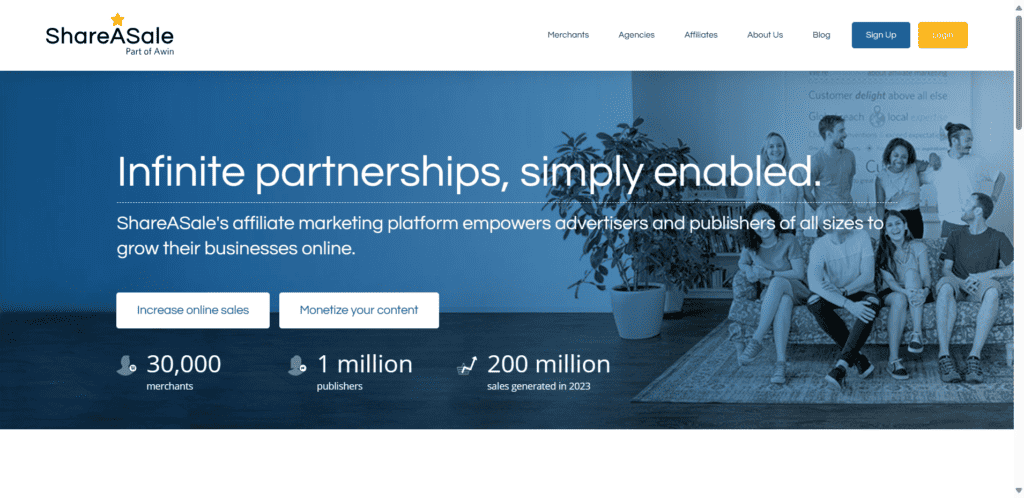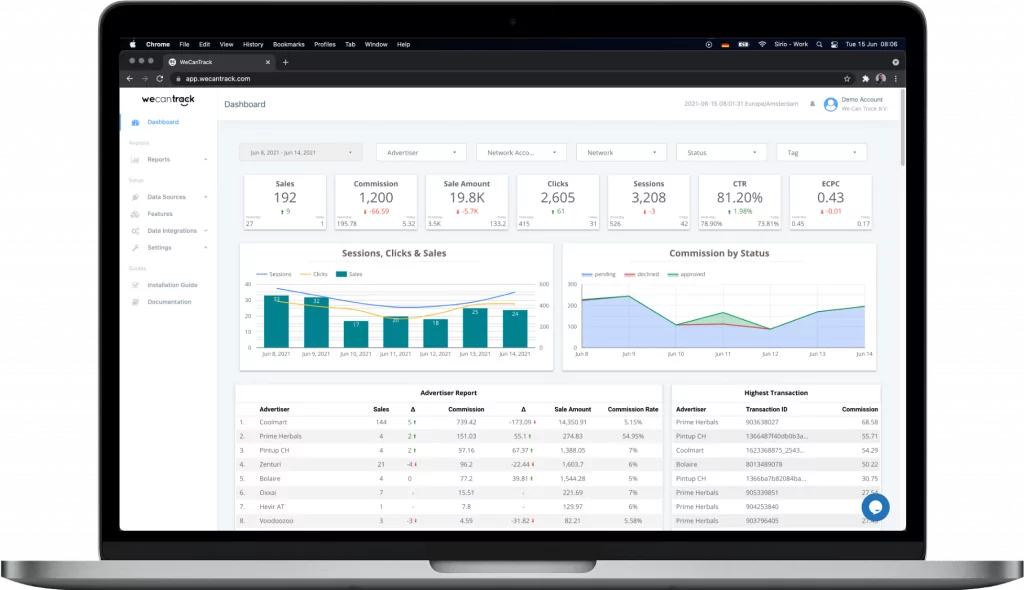Affiliate marketing is a form of online marketing where an affiliate earns a commission for promoting someone else’s products or services. In other words: with affiliate marketing, you can earn an online income without having to sell your own products, keep stock, manage shipments and returns, or do customer service.
That’s affiliate marketing in a very tiny nutshell. It’s what makes it alluring to many would-be online entrepreneurs. Affiliate marketing brings with it the promise of making money while you sleep.
Of course, there’s much more to affiliate marketing. This is why, in this article, we’ll answer the question “What is affiliate marketing?” by answering 36 additional questions about affiliate marketing, to which any affiliate should know the answer.
Table of Contents
What Is Affiliate Marketing (30 Questions)
1. How does affiliate marketing work?
For the affiliate, the first step is to decide on a niche and start a website. A niche is the topic your website will be about. Try to narrow this down as much as possible: an affiliate website with a good focus on a specific topic has a higher chance of success.
Next, you’ll need to find an affiliate program or network to sign up to. You can read more about what affiliate programs and networks are later in this article.
For now, it is important to understand how an affiliate network works in the broad sense. An affiliate network acts as an intermediate between affiliate and advertiser, making it easier for the affiliate to find products to promote and manage clicks, conversions, and earned commissions.
Look for an affiliate network that features online stores and products that fit the niche that you have chosen. Then it’s time to create content, answering questions that your audience is looking for. In this content, you’ll be linking to products and services that’ll help your readers to accomplish their goals.
To do this, you’ll use a special affiliate link, that enables the program or network to track whoever clicks your link and visits the page you are linking. As an advertiser, affiliate marketing works the easiest by signing up to an existing affiliate network.
This enables you to get your online store promoted by all the affiliates that are enrolled in the network and you’ll get the necessary help setting up.
You can also opt for building your own affiliate program. You have more control in this way but will need to find the affiliates to promote your products yourself and ensure that tracking is in order.

Affiliate marketing is a performance-based strategy where individuals (affiliates) earn a commission by promoting products or services of other companies. When a conversion happens through their unique affiliate link, they receive a portion of the revenue.
2. What are the benefits of Affiliate Marketing?
We now have a better understanding of what it is, but what are the benefits of affiliate marketing? We can divide those benefits in two categories. The most important benefits of affiliate marketing for the merchant are:
- Paying for performance. Other than in many other forms of online marketing, you won’t have to pay until a sale has been made. This makes affiliate marketing low risk and available at low start-up costs.
- You’ll get highly targeted traffic, since it’s in the publisher’s best interest to ensure that the people they sent your way are actually interested in your services.
These two factors combined make the ROI on affiliate marketing generally pretty high. It also allows the merchant to scale up or down pretty easily.
The benefits of affiliate marketing for affiliate marketers are mainly that it is an ideal way to monetize your own specific knowledge, or the audience that you have already acquired.
The benefits of affiliate marketing center around the fact that it is a way to build a passive income for yourself from a website or blog that you can work on whenever and wherever you want.
3. Which companies do affiliate marketing?
If you’re reading this and are starting to get interested in affiliate marketing, chances are you’re beginning to wonder which companies actually do affiliate marketing.
This is an important question because, as an affiliate marketer, you’ll depend on the range of products and services you can promote. What if you can’t find an affiliate program for the stuff you’re trying to build a website about? No need to worry.
By now, thousands of companies are active in affiliate marketing. All major e-commerce players have their own affiliate programs, like Amazon, Best Buy, Home Depot, Etsy, and Geekbuying.
So you won’t have to worry about finding a program with the right products for you. Still don’t believe us? Just read this article explaining why affiliate marketing is still worth it. It shows the exponential growth that affiliate marketing is going through.
4. Difference between Affiliate Marketing and Network Marketing
This is a good place to write about the most important difference between affiliate and network marketing. The two share the same basis: a third party promoting the products from a particular merchant.
However, affiliate marketing focuses on bringing awareness and traffic to the merchant’s website or shop. Actual sales are being made there, and a commission is paid accordingly.
Network marketing, on the other hand, refers to an approach where a network of distributors sells products person-to-person. This means that the main difference between affiliate marketing and network marketing lies in the fact that an affiliate is compensated through commissions for generated traffic or sales. In contrast, a network marketer earns money through actively selling the products themselves.
5. What are Affiliate Marketing links?
Affiliate marketing links are links containing additional URL parameters and IDs that are unique to each affiliate. This makes it possible for the merchant – or the affiliate program or network – to track where a person visiting the merchant’s website is coming from.
That way, purchases or other actions that a visitor does on the website can be attributed to the right affiliate to pay them the commission. You can hide or disguise the fact that you’re using affiliate links by leveraging link cloaking.
This means that you’ll use a redirect link to send people to your affiliate link, so they won’t see the affiliate link when hovering over the link or button.
6. How does commission work in Affiliate Marketing?
Commission in affiliate marketing works by tracking the performance of an affiliate through the affiliate links we discussed above based on a predetermined goal that needs to be reached.
That goal can simply be visiting the website, which means that the height of commission will be based on the number of visitors an affiliate sends to the merchant’s website. It can be downloads of a white paper, signups for a newsletter, or commission, which can be a percentage of the realized revenue.
7. Is Affiliate Marketing legit?
Yes, affiliate marketing is a legitimate form of online marketing. Figures show that it is one of the most popular and fastest-growing forms of (online) marketing.
Affiliate marketing is based on a good synergy, trust, and understanding between affiliate and merchant. It is in both parties’ best interest to strive for optimal performance.
The publisher will benefit most from sending quality traffic to the merchant’s site. On their part, the merchant needs to ensure that the traffic conversion is optimized and tracked so that the publisher feels they are getting enough from the traffic they’re sending over.

8. What is a niche in Affiliate Marketing?
A niche is your way to specify and target the information, products, and affiliate programs you’ll be promoting. In a niche, you’ll focus on a specific target audience looking for specific information and products you’ll be providing.
One of the biggest mistakes many newcomers in affiliate marketing make is choosing to broad a niche, which makes it hard for them to compete with existing, bigger platforms.
For example, when you focus your affiliate website on the “losing weight niche”, chances are you won’t be able to compete with the hundreds and thousands of people already targeting that niche. Instead, you might have a narrower focus on something like “losing weight using the primal diet.”
The narrower your niche in affiliate marketing, the higher your chances of success. So, choosing the niche you’ll be targeting is one of the biggest and most important choices for your budding affiliate marketing career. The niche that you’ll choose is part of what – in affiliate marketing – is called a vertical.
9. What are verticals in Affiliate Marketing?
So, what does vertical mean in affiliate marketing, you ask? A vertical is a broad segment of the online demographic that tells you how they behave online. For example, the dieting niche we described before would be part of the “health and nutrition” vertical. Other examples of verticals in affiliate marketing include:
- Pets
- Insurance
- Finance
- Home decor and improvement
- Online Education
It is good to have an idea of the vertical in affiliate marketing that you are active in, even if you’re focusing on a very specific niche area of that vertical. This helps you get a broad view of your competitors, content ideas for your audience, or perhaps people targeting another niche in your vertical that you might collaborate with.
10. Is Affiliate Marketing a pyramid scheme?
No, affiliate marketing is not a pyramid scheme. A pyramid scheme works by attracting people to invest money and then getting others to invest, thus making their original investment worth more.
Affiliate marketing is not like this at all. It is a collaboration between a merchant and an affiliate, who is promoting the merchant’s products in exchange for a commission. The affiliate is not invested personally in the merchant’s products and doesn’t benefit from others investing in them.
11. Types of Affiliate Marketing Websites
There are different types of affiliate marketing that you can focus on to drive traffic or sales for a merchant. Here are the most important types to get you inspired:
- Comparison websites focus on helping people find the right product for a specific need. For example, they list the best pressure cookers on the market, with the pros and cons of each pan. Of course, every comparison article would be filled with affiliate links to where readers can buy the products.
- Coupon websites offer deals for online bargain hunters. A merchant can promote deals or discounts via these platforms by offering a coupon code that earns a commission for the coupon website whenever it’s used to buy something from the merchant. Cashback websites take a similar approach.
- Content websites focus on creating relevant and valuable content around a specific topic. This can include – but isn’t limited to – comparison content or might throw in a coupon code whenever relevant.
- Bloggers are very similar to this approach, but they generally focus on writing about their lives to acquire a following of readers and then promote items to them. In contrast, a content website mainly focuses on writing about a topic.
- News platforms focus on attracting readers by sharing the latest news about a topic and monetizing that audience using affiliate links.
12. What is an Affiliate Network?
We already teased this one in the section on affiliate programs, so let’s answer the question: what is an affiliate marketing network, and what are its prime advantages?
An affiliate network is a group of affiliate programs. In this way, affiliate networks act as an intermediary between publishers and the affiliate programs of advertisers, making it easier for affiliates to find the right products or services to promote and for merchants to reach potential publishers.
Affiliate networks can get pretty big. To give you an idea, here are some numbers on the biggest affiliate networks. Affiliate software is often seen as an alternative to using affiliate networks. But what is the advantage of using affiliate software instead of an affiliate network? Both offer different benefits.

13. Benefits of Affiliate Marketing Software
The benefit of using affiliate marketing software is that you don’t have to pay hefty fees to the affiliate network. As a merchant, it can be costly to be allowed to enrol in a network, thus cancelling out the low start-up cost advantage of affiliate marketing that we mentioned earlier.
Transparency is a significant benefit of affiliate marketing software. As an affiliate, you might not want to depend on the data that an affiliate network offers you. It can help you grow your business more efficiently by leveraging your affiliate dashboard, showing you precisely what you need to see daily via real-time tracking and reporting.
Tracking and attribution provided by affiliate marketing software are essential for analyzing your data and adequately scaling your affiliate performance. You can integrate your commission and sales data into your marketing tools, like Google Analytics, Google Ads, Microsoft Ads, Facebook ads, and many other ad networks.
14. Benefits of affiliate marketing network
The most crucial benefit of an affiliate network is its reach. As an affiliate, you won’t have to scour the internet to find that one merchant with an affiliate program that fits your content.
Similarly, merchants won’t have to find and approach many possible publishers individually but can reach a massive crowd of possible affiliates by simply putting their offer out there.
15. What is an Affiliate Marketing agency?
An affiliate marketing agency helps merchants leverage affiliate marketing in the right way that will make their business grow. They can help the merchant set up the right affiliate marketing program, connect through a network, find the right affiliates and influencers, and manage the overall performance of the affiliate marketing efforts.
16. What is direct linking in Affiliate Marketing?
Direct linking in affiliate marketing is when an affiliate links straight to the advertiser’s website from their own advertisements in ad networks. Normally, an affiliate would use advertisements to attract people to their own content, in which a link to the merchant is made. So something like:
Ad in Google > Affiliate’s comparison article > Merchant’s offer page.
With direct linking campaigns, this becomes:
Ad in Google > Merchant’s offer page.
An advantage of direct linking is that there are fewer steps between your promotion activities and the final offer of the merchant, meaning fewer places where your audience might drop out.
However, many affiliate networks don’t allow direct linking as mentioned above since it is regarded as deceiving the customer by making it look like you’re advertising as the merchant.
17. What is PPC affiliate marketing?
PPC affiliate marketing – or pay-per-click affiliate marketing – is a form of attribution where the affiliate receives a commission whenever someone clicks on the ads or links on their website. This is basically how advertising works in search engines – like Google Ads or Bing Ads – or on social media platforms like Facebook, Instagram, or TikTok.
18. What is SEO Affiliate Marketing?
SEO affiliate marketing is when you, as an affiliate, leverage SEO to attract readers to your affiliate content. SEO – Search Engine Optimization – is the art of writing great quality content that reaches high rankings in Google. This leads to a continuous stream of free (also called “organic”) visitors that find your website through the Google result page.
19. What does JV mean in Affiliate Marketing?
Asking the question of what JV means in affiliate marketing can be a little misleading since it suggests that JV is something that is used in affiliate marketing.
This is not the case. JV stands for Joint Venture, and someone can be a Joint Venture Partner to a business just like someone might be an affiliate. A Joint Venture Partner typically refers to a relationship that goes deeper than the one between an affiliate and an advertiser.
An affiliate simply promotes the advertiser’s products or services in exchange for a commission. In a Joint Venture, other arrangements and a more personal collaboration are made.
Typically, one would choose a JV over affiliate marketing to get the big players in your particular niche on board by making them a part of your business instead of just letting them promote the product from the sidelines as an affiliate.
20. How does Affiliate Marketing for YouTube work?
Affiliate marketing on YouTube works in the same way as other forms of affiliate marketing. This means that you can earn an income via YouTube affiliate marketing by adding tracking links in the description of the videos that you upload to your channel.
When your audience follows the links that you recommend with your YouTube videos in this way, you’ll earn a commission. Other social media channels can be leveraged in much the same way.
21. What is high-ticket Affiliate Marketing?
This is a very popular form of affiliate marketing; High-ticket affiliate marketing means earning higher profits on fewer sales. This is like the holy grail for any online entrepreneur.
Typically, high-ticket affiliate marketing applies to high-grossing verticals and niches, like insurance, high-end jewellery, and finance. Whereas many affiliate products would earn you a few dollars per sale, you might look at hundreds or even thousands of dollars per conversion with high-ticket affiliate marketing.
Because of those lucrative commissions, high-ticket affiliate marketing deals are usually very competitive. This means it’ll take a lot of time and effort to get your content to rank, build up an audience, and get the traffic flowing through your tracking links.
High-ticket affiliate marketing is, therefore, only worth your while, usually in evergreen markets. What does the evergreen market mean in affiliate marketing? An evergreen market in affiliate marketing is a market that is not time-bound.
Once you’ve built your audience and ranking, people will keep coming to your content. Evergreen markets aren’t seasonal and aren’t hype-related. People will always seek advice on mortgages, personal loans, or how to combine pearls with evening attire. Those are the kind of evergreen markets that you want to target in high-ticket affiliate marketing.
22. Is high ticket affiliate marketing legit?
High-ticket affiliate marketing is just as legitimate as any other form. However, when dealing with specific niches and verticals, you must consider the local laws regarding advising on that topic. Also, remember that Google has become more cautious in ranking content on sensitive topics.
Especially with verticals like health and personal finance, the potential risk for your audience when given bad advice is quite significant. Google calls this “Your money or your life searches.” This is why Google has become much stricter about whether or not they rank your website on topics like these, making it even harder to attract an audience when you target those verticals.
If you’re promoting this product via paid advertisement, Google, Microsoft, or Facebook will likely suspend your account within some time.
23. What is cookie duration in affiliate marketing?
An important aspect of a cookie is the cookie duration that the merchant of the affiliate program is offering. This is mostly measured in days. So, what does cookie days mean in affiliate marketing?
Cookie days are simply the number of days someone will be tracked after clicking one of your tracking links. Let’s say that someone clicks one of my affiliate links today but isn’t ready to buy immediately.
They might save the page of the offer or write down the URL somewhere. If, in a few more days, they have decided to buy the product, they probably won’t go to the offer through one of my links again. But I’m still the one that made them originally aware of the offer.
Therefore, the number of cookie days – also called the cookie duration or the cookie lifetime – ensures that the transaction will also be attributed to me a few days after originally clicking my link.
24. What do impressions mean in affiliate marketing?
Impressions are another way of looking at the performance of your content and offers. Impressions, meaning in affiliate marketing, are the number of times someone has seen the offer you are promoting.
Compared with the number of clicks on that same promotion and the actual sales, this gives you a good indication of the success of that particular offer.
If, for example, the number of impressions is very high, but there are not a lot of sales, that particular promotion might not be a good fit for your audience.
25. What is EPC in affiliate marketing?
EPC is one of the most important metrics you’ll use to monitor the success of your affiliate marketing endeavours. But what exactly does EPC mean in affiliate marketing?
The EPC meaning in affiliate marketing becomes clear once you know it’s an abbreviation for “earnings per click.” Simply put, EPC is the average commission you make when someone clicks on your affiliate link.
You can go about boosting your total revenue in a couple of ways. One is increasing the number of times someone clicks your link. Another way is to increase the money you make for every click, in other words, the EPC. In this regard, asking what upsell means in affiliate marketing is also interesting.
An upsell is when you persuade a customer to choose a more expensive version of the product they were initially buying or buy additional add-ons, increasing the total revenue of that one customer.
Upselling is a great way to increase the value per conversion in affiliate marketing and thus boost the potential earnings for every click you realize or the EPC.
26. How do affiliate marketing cookies work?
Affiliate marketing cookies connect the action of someone clicking one of your affiliate links to someone placing an order or converting in some other way on the merchant platform.
In other words, affiliate marketing cookies make it possible to track the actions of a visitor over different websites, ensuring that you’ll get the right amount of commission for your efforts.
Once someone clicks a tracking link on your platform, the affiliate software will take care of the placement of the cookie, allowing for the tracking of that person after leaving your website and entering that of the merchant.
27. What is CPA affiliate marketing?
The most broad type of affiliate marketing program is CPA. Great, so what does CPA mean in affiliate marketing? So glad you asked. CPA stands for “cost per action”, and it allows merchants to pay their affiliates based on a specified action that their visitors need to fulfill.
In other words, CPA, is quite broad. It can mean that you – as an affiliate – are paid for any number of actions that your audience might take on the merchant’s website. Those actions can be, for example:
- Subscribing to a newsletter
- Downloading an ebook
- Clicking on a banner or promotion
- Creating an account
- Adding an item to their cart
- Making a purchase
Every time someone makes that specific, desired action, this is considered to be a conversion.
28. What does CPS mean in affiliate marketing?
CPS in affiliate marketing stands for “cost per sale,” and it is a more specific variety of the CPA model. Whereas in CPA, any action might be considered a conversion, in CPS, the performance and commissions of an affiliate are entirely linked to the number of sales the affiliate causes.
Cost per sale is the most common type of affiliate marketing program, especially with e-commerce platforms. The commission is then usually a percentage of the racked-up revenue.
29. What does CPL mean in affiliate marketing?
CPL – or “cost per lead” – is yet another affiliate marketing program most commonly used in the service sector, where direct sales are less common than in e-commerce.
CPL means if any of your visitors show an interest in the service that you are promoting. Typically, this interest is shown by filling out an online form to request more information or make an (online) appointment, but someone who downloads an ebook or brochure might also be considered a lead.
A lead, then, is anyone who has shown interest in the merchant’s services in a way that makes it possible for said merchant to follow up on that interest and try and get that person to become a customer.
30. What is CPI in affiliate marketing?
CPI in affiliate marketing is the abbreviation for “cost per install” affiliate programs, and it means that as an affiliate, you’ll get a commission for any installation of an app or piece of software that you’ll accomplish for the merchant.
This is a popular practice with “software as a service“ companies, and they’re usually amongst the most lucrative affiliate marketing programs to promote.
The commission rate on software is usually high, given that the merchant doesn’t have additional costs for selling an extra piece of software. If you’re interested in selling software as an affiliate, you should look at our list of the best SAAS affiliate programs out there.
Types Of Affiliate Marketing Programs
The most important types of affiliate marketing programs come in one of the following forms:
- CPA
- CPS
- CPL
- CPI
These types of affiliate marketing programs refer to the way in which commissions are attributed based on the action that is required to earn a commission. We’ll wrap up this affiliate marketing guide by discussing each below.
Final Thoughts
By answering the 30 most asked questions about affiliate marketing, we hope to have given you a concise overview of everything you need to get started or improve your success as an affiliate marketer.
If after reading all this, you’re excited about upping your affiliate marketing game, we encourage you to take a look at all our integrated affiliate networks, to find those affiliate programs that are going to make a difference for you.
Use our attribution dashboard to keep an overview of all the clicks, sales, installations, and other actions that are coming your way, and find the right focus for your optimization efforts.







